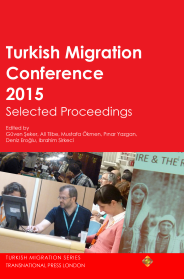Economic and Financial Aspects of Forced Migration from Bulgaria in 1989
Economic and Financial Aspects of Forced Migration from Bulgaria in 1989
Author(s): Mustafa Miynat, Öznur Akyol, Deniz Alçin Şahintürk
Subject(s): Geography, Regional studies, Economic history, Political history, Post-War period (1950 - 1989), Migration Studies
Published by: Transnational Press London
Keywords: Bulgaria; Turks; migration; forced migration; 1989; economic aspects;
Summary/Abstract: The pressures that started with the name changes of Turkish villages in the 1930s began to rise even further with the “one nation” decision of the communist regime in 1956. By the year 1984, the Turks whose names were changed perforce due to the assimilation policy in Bulgaria and whose languages were banned started a resistance campaign, which was widely supported by the Turks in the resistance zone. The Bulgarian government has forced the Turks to migrate in 1989 in order to avert Turkish people from gaining further power in the region. The then Prime Minister Turgut Ozal has offered the introduction of a migration law which the Bulgarian government rejected, declaring a forceful expulsion within twenty-four hours. The 1989 Bulgarian immigration went down in history as the largest migration movement in Europe after the Word War II. In our study, the economic and financial impacts of the tragedy that the Turks went through in Bulgaria are discussed.
Book: Turkish Migration Conference 2015 Selected Proceedings
- Page Range: 16-22
- Page Count: 7
- Publication Year: 2015
- Language: English
- Content File-PDF

